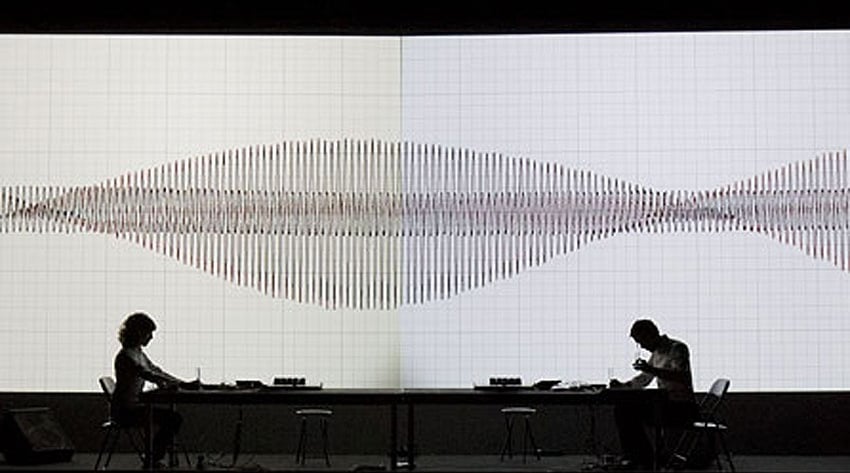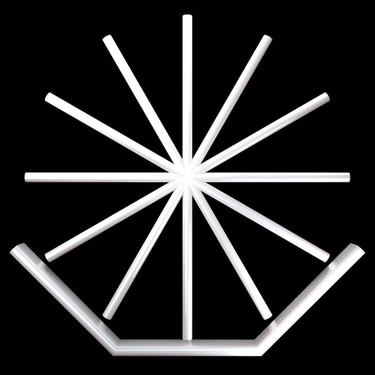Ryoji Ikeda Merges Technopoetics at Royce Hall
Lydia Janbay
12/4/2014


A new aesthetic is emerging at the nexus of art and science. One of its pioneers is electronic composer and visual artist Ryoji Ikeda, who has garnered acclaim as one of the few international artists working convincingly across disciplines. His past projects — some which focus on the sonic and visual qualia of mathematical notions — are galvanizing an era of experimental creativity. This November at UCLA’s Royce Hall, sharing the same stage where Albert Einstein once stood, Ikeda’s multimedia work, superposition, took shape in the most astounding manner.
The immersive experience consisted of digital screens bracketed by columns of speakers — ten screens downstage, ten larger ones behind them, and a floor-to-ceiling screen across the back. One night with Ikeda was disorienting yet strangely enchanting: data from organizations such as NASA condensed into point clouds; two performers manipulated tuning forks; lights came and fled. The 65-minute piece centered on quantum information, exploring it through the poetics of precision and randomness. The show occupied a unique position between imagination and technology, allowing information to work as a fact and a symbol. Abstraction and representation became intertwined.
While there are traces of the noise theories of Luigi Russolo and Iannis Xenakis, these are not the groundwork so much as points of departure for Ikeda. In superposition, some sounds are spliced and condensed into micromontage. Their textures seemed processed through granular synthesis, eliciting disorder as a counterpoint to the controlled visual imagery. At other times, sine waves and square waves, along with moments of ambient minimalism, arose systematically. Ultimately, both the pure-tones and heavily treated sounds explore themes of fluidity and doubt.
The performers invited a degree of randomness, a possibility of a malfunction that was much more akin to a crash. Each of their moves risked an array of micro-phenomena due to human error. The act of observation was encouraged to be subjective. Each of the two performers tapped out Morse code statements that diverge in meaning, occupying either a negative or positive position on each screen. One such sentence was “logic is not a body of doctrine but a mirror image of the world.” These phrases permute the implications of words like “knowledge,” “science,” “mind,” and “matter.” This indeterminacy permeates the entire work. When contrasted with the more exacting elements within the work, each rendition of superposition becomes infinitesimal. Obliged to focus on reading a single screen, the viewer must decide where to look. The sterility of truth is clouded by the choices of the living, by us.
In these ways, technological themes in Ryoji Ikeda’s superposition are eroded into fundamental forms – data, spectra, and time. Evoking the transient nature of quantum networks, the blips and bright light converged in moments of digital poetry, and fell away. There was a palpable rhythm: deafening waves of noise aligned into measured gaps, the precision lingered, and then lent itself to chaos once again.
